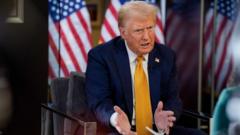In addition to his immigration reform proposals, Trump expressed a plan to issue a multitude of executive orders focusing on economic, energy, and immigration policies the moment he is inaugurated. He also indicated his willingness to work with Democrats on matters concerning undocumented immigrants who arrived during childhood, potentially moderating his past extreme measures, including mass deportations.
The former president further confirmed his intent to pardon individuals involved in the January 6 Capitol riot, stating he will assess cases independently and move to act "very quickly." Trump's comments reflect a broader theme of seeking retribution against perceived political adversaries, as he suggested lawmakers who investigated the riot be jailed while distancing himself from pursuing investigations into the Biden family.
As he navigates contentious political waters, Trump's comments extend to international matters, with a suggestion of reduced U.S. aid to Ukraine and a complex relationship with NATO based on fairness in financial contributions. The unfolding political landscape as Trump re-enters the White House raises questions about his approach to governance, collaboration, and the legacy he aspires to leave behind.
Ultimately, Trump's return to the presidency is set to stir considerable debate and legal challenges, particularly regarding his proposals on citizenship, immigration, and maintaining the balance of power within the government.
The former president further confirmed his intent to pardon individuals involved in the January 6 Capitol riot, stating he will assess cases independently and move to act "very quickly." Trump's comments reflect a broader theme of seeking retribution against perceived political adversaries, as he suggested lawmakers who investigated the riot be jailed while distancing himself from pursuing investigations into the Biden family.
As he navigates contentious political waters, Trump's comments extend to international matters, with a suggestion of reduced U.S. aid to Ukraine and a complex relationship with NATO based on fairness in financial contributions. The unfolding political landscape as Trump re-enters the White House raises questions about his approach to governance, collaboration, and the legacy he aspires to leave behind.
Ultimately, Trump's return to the presidency is set to stir considerable debate and legal challenges, particularly regarding his proposals on citizenship, immigration, and maintaining the balance of power within the government.





















